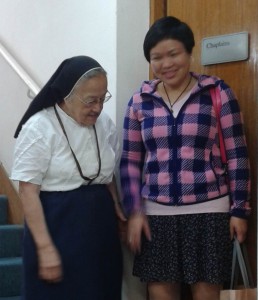
Soon after you arrive in Hong Kong, you list with an employment agency, and find work relatively quickly with a family living in a city apartment. Unfortunately, not long after you begin work there, your employer begins to abuse you, not simply insisting on perfection in your work, but actually physically beating you, sometimes with clothes hangers, once with the metal tube of a vacuum cleaner. As if that weren’t horrifying enough, she only lets you go to the bathroom twice a day, and permits you only a few hours of sleep each day. When you do sleep, you’re confined to a closet, and must curl up on a hardwood floor, pushing aside bags of books to make room for yourself.
It’s the stuff of which nightmares are made and, for Erwiana Sulitsyaningsih, the very facts of a life turned hellish. During her employment in the Hong Kong home of Law Wan-Tung, Erwiana “worked 20 hours a day, was not given proper food, slept in a corner in the kitchen, was beaten or punished severely” and “not paid her wages,” said Maryknoll Sister Joseph Lourdes, who works with the Asia Pacific Mission for Migrants (MFMW), an organization related to the Mission for Migrant Workers, the group which ended up coming to Erwiana’s rescue.
Through the MFMW, for which another Maryknoll Sister, Marilu Limgenco, works and serves as a member of its Board, Erwiana was able to gain the critical legal counsel and representation she required, as well as support and housing at Bethune House, the shelter where many migrant workers have stayed during difficult times.
“We are all very pleased with the outcome of Erwiana’s case,” which sentenced Ms. Law to seven years in prison, Sister Joseph Lourdes said, speaking for everyone at MFMW and its related organizations. “The verdict will help to change such abusive situations for migrant workers.”
Erwiana, who is now rebuilding her life (she hopes to one day be an accountant), thanks in part to the work of MFMW, says she forgives her employer but also hopes that the high-profile coverage of her case, including stories on CNN, the BBC and the New York Times, will result in gaining justice and improved working conditions for many other household workers who are suffering similar cruelties. Currently more than 300,000 migrant workers, 90 percent of them women, are employed in Hong Kong, many of them undergoing abuse akin to that which Erwiana suffered.
Established in 1981, the year Sister Marilu first arrived in Hong Kong, the MFMW is a registered charitable organization dedicated to delivering responsive services to Asian migrants and developing self-sustaining capacities of migrant’s organizations for mutual aid and cooperation. The longest existing independent service provider for migrants in Hong Kong and Asia includes among its programs for migrant workers services which provide labor and employment assistance; pastoral care and social welfare; legal rights protection; issues awareness, education, and training; works aimed at ending violence against women and empowering women themselves; networking migrants with public services that can assist them; and educating the general populace about current conditions of migrant workers in Asia and building relational bridges between them.
[envira-gallery-dynamic id=”custom” images=”1759,1760,1761″]
